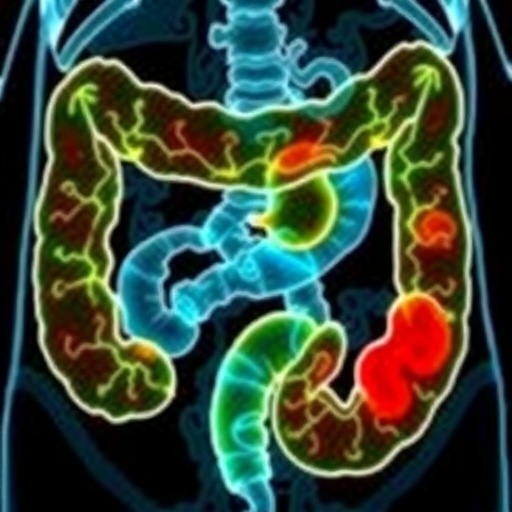In a groundbreaking study poised to reshape our understanding of colorectal cancer development, researchers have uncovered a critical molecular mechanism by which the protein TRIM21 drives tumor progression. This discovery not only illuminates the intricate biological pathways underpinning one of the most prevalent cancers worldwide but also opens promising avenues for targeted therapeutic interventions. The work, recently published in Cell Death Discovery, elucidates how TRIM21 modulates DNA replication dynamics through a finely tuned regulatory axis involving the transcription factor TCF3 and the DNA replication licensing complex components MCM2 and MCM5.
Colorectal cancer remains a formidable clinical challenge due to its high incidence and often late diagnosis, emphasizing the need for deeper mechanistic insights. The current study zeroes in on TRIM21, a member of the tripartite motif (TRIM) protein family known for its ubiquitin ligase activity and diverse roles in cellular homeostasis. While TRIM21’s function in immune regulation has been explored previously, its precise contribution to cancer development had been inadequately understood until now. By integrating biochemical assays, gene expression analyses, and in vivo models, the researchers delineate how TRIM21 exacerbates colorectal tumorigenesis via deregulating the fundamental process of DNA replication.
Central to the study is the identification of a signaling axis whereby TRIM21 influences the transcriptional activity of TCF3, a transcription factor vital for maintaining cellular proliferation. TCF3, in turn, modulates the expression of minichromosome maintenance proteins MCM2 and MCM5, which are indispensable for initiating and sustaining DNA replication. The MCM complex functions as a replicative helicase, unwinding DNA at replication origins, thereby ensuring faithful genome duplication. Dysregulation of these components is frequently linked to genomic instability, a hallmark of cancer cells. The authors demonstrate that heightened TRIM21 expression augments TCF3 activity, culminating in upregulation of MCM2 and MCM5, leading to accelerated DNA synthesis and uncontrolled cell division characteristic of malignancy.
The research team employed advanced chromatin immunoprecipitation followed by sequencing (ChIP-seq) to map binding sites of TCF3 across the colorectal cancer genome, confirming direct regulatory connections to MCM2 and MCM5 promoters. Additionally, quantitative PCR and Western blot analyses corroborated elevated transcription and protein levels of these replication factors in TRIM21-overexpressing tumor samples. Functional knockdown experiments revealed that silencing TRIM21 significantly impaired DNA replication efficiency and hampered tumor cell proliferation, underscoring its pivotal role in cancer cell cycle progression.
In vivo validation using mouse xenograft models further strengthened the causal link between TRIM21 activity and colorectal cancer aggressiveness. Mice implanted with TRIM21-depleted cancer cells exhibited slower tumor growth and increased survival rates compared to controls. Intriguingly, these findings suggest that therapeutic strategies targeting the TRIM21-TCF3-MCM2/5 axis could disrupt malignant replication circuits, potentially limiting tumor expansion and improving patient outcomes.
Beyond the mechanistic insights, this work highlights the intricate interplay between ubiquitin-mediated signaling and transcriptional control in cancer biology. TRIM21’s ubiquitin ligase functionality appears to stabilize TCF3 or modify its transcriptional co-factors, thereby fine-tuning gene expression networks critical for DNA replication. Such crosstalk exemplifies the complexity of oncogenic pathways and reinforces the premise that cancer cells exploit multifaceted regulatory systems to sustain their proliferative advantage.
Moreover, the discovery of the TRIM21-driven regulatory mechanism proposes a novel biomarker for colorectal cancer prognosis. Elevated TRIM21 expression correlates with more advanced tumor stages and poorer clinical outcomes, suggesting its utility in patient stratification and therapeutic decision-making. Biomarkers that accurately reflect underlying molecular pathogenesis are invaluable for personalized medicine, enabling clinicians to tailor interventions based on tumor biology.
The study’s comprehensive approach combined molecular biology techniques with clinical sample analysis, lending robustness and translational relevance to the conclusions. Transcriptomic profiling of tumor biopsies confirmed the overexpression of TRIM21 and downstream targets in a substantial cohort of colorectal cancer patients. These data endorse the generalizability of the findings and motivate further exploration into pharmacological inhibitors targeting this axis.
Importantly, targeting the TRIM21-TCF3-MCM2/5 pathway may also circumvent resistance mechanisms that commonly plague current colorectal cancer therapies. By attacking the fundamental process of DNA replication orchestration, therapeutic agents could exert profound antiproliferative effects. Future drug discovery efforts may focus on disrupting protein-protein interactions within this axis or modulating TRIM21’s enzymatic activity to restore replication fidelity.
The implications of these findings extend beyond colorectal cancer, as aberrant regulation of DNA replication factors is a universal feature of many malignancies. Given the conserved nature of the MCM complex and transcriptional regulators like TCF3, similar mechanisms may operate in other tumor types. This broadens the relevance of the study and invites comparative oncological investigations across a spectrum of cancers.
In conclusion, this pioneering research delineates a hitherto unrecognized pathway by which TRIM21 fuels colorectal cancer progression through direct regulation of DNA replication machinery. By orchestrating the TCF3-mediated transcriptional activation of MCM2 and MCM5, TRIM21 establishes a proliferative program enabling tumor cells to thrive. This work not only advances fundamental cancer biology but also sets the stage for innovative therapeutic strategies targeting replication control in malignancies. As colorectal cancer continues to exact a heavy global toll, discoveries such as these illuminate promising paths toward more effective treatments and improved patient survival.
Subject of Research: TRIM21’s role in colorectal cancer development through regulation of DNA replication machinery.
Article Title: TRIM21 promotes colorectal cancer development through regulating DNA replication by TCF3/MCM2/5 axis.
Article References:
Zhang, X., Yao, H., Hou, Y. et al. TRIM21 promotes colorectal cancer development through regulating DNA replication by TCF3/MCM2/5 axis. Cell Death Discov. 11, 422 (2025). https://doi.org/10.1038/s41420-025-02722-3
Image Credits: AI Generated
DOI: https://doi.org/10.1038/s41420-025-02722-3
Tags: biochemical assays gene expression analysiscancer biology and molecular pathwayscolorectal cancer incidence and diagnosisDNA replication dynamics in cancerin vivo models in cancer researchmechanistic insights into colorectal tumorigenesistargeted therapies for colorectal cancerTCF3 MCM2 MCM5 regulatory axisTRIM21 colorectal cancer mechanismTRIM21 role in tumor progressiontripartite motif protein familyubiquitin ligase activity in cancer





